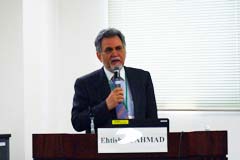Professor Ehtisham Ahmad Gives Seminar on 'Handbook of Multilevel Finance,' New Approaches That Account for Political Economy
2015.08.17
There has been a great deal of work in the past decade or so on how institutions and incentives are critical in ensuring effective public policy outcomes. This leads to different conclusions from the "normative" recommendations largely based on U.S. post-World War II experiences, even in the EU. International donors, lenders and institutions in advising developing countries have assumed that the normative approach applies, but most countries do not have the same taxation structure and accountability as in the US. Quite often informality and incentives to cheat are ignored, and decentralization processes may not meet expectations, with consequent misallocation of resources and bad outcomes, says federalism and economics scholar Ehtisham Ahmad.

Dr. Ehtisham Ahmad
Therefore, new approaches are needed that reflect the political economy constraints in specific countries, incentives and motivations of stakeholders. There is a great deal of work on the theoretical issues involved, as well as practical applications of the political economy or "positive" approaches. These new approaches are explored in "Handbook of Multilevel Finance," co-edited by professor Giorgio Brosio of the University of Turin in Italy and Ahmad, who gave a seminar on the recently published book July 28, 2015, at JICA Research Institute in Tokyo.
Ahmad is a senior fellow at the Center for Development Research at the University of Bonn and the Asia Research Centre of the London School of Economics. His research interests include the design of public policies, governance and distributional questions; political economy of intergovernmental fiscal relations; public economics; federalism; and applied fiscal issues in China, South Asia, Latin America, and several Middle Eastern countries. He has held senior positions at the World Bank and International Monetary fund and advised governments around the world.
Multilevel finance "deals with the organization and structure of government when you have more than one level of government," Ahmad explained. "You have to take into account incentives for government, for investors in the private sector, workers and effects on households in different circumstances - this involves a focus on the poor and inequality. So it's the whole economy."
Why were such incentives not taken into account in the old, normative theory?
"In the Cold War period there was a struggle between the American style of government and life and the Soviets. International institutions were greatly influenced by the United States," Ahmad said. "The assumption was one of benevolent governments, with clearly defined functions. So there was no room for political economy considerations."
In his lecture Ahmad gave a step by step overview of the book, which provides a review of the latest theories based on both normative and positive approaches. Among the policy implications that could be drawn, are several chapters that focus on:

Dozens of people gathered for the seminar
Ahmad gave anecdotes to illustrate his points from countries around the world including Iraq, Yemen, Pakistan, Indonesia, China, Chile, Mexico, Germany and Greece.
During the question and answer session that followed the seminar, a questioner asked whether Mexico faced resistance in re-centralizing education after attempting to decentralize it. Ahmad said the Mexican federal government, which was in any case paying for the teachers at the local levels, indeed did face resistance. Teaching jobs were being traded and passed from generation to generation and had become entitlements. So the federal government enacted a policy of confirming the identity, teaching credentials and actual work of the people who held teaching jobs. The leverage they used was the financing tools of wages, operations and maintenance.
"They basically said, 'We're paying the wages, we're paying the operations and maintenance. We're going to make sure it gets done right.' Despite the resistance, that was very nicely done," Ahmad said.
This is particularly important given the role that education has to play in economic development, but is different from the typical recommendation to decentralize education.

事業事前評価表(地球規模課題対応国際科学技術協力(SATREPS)).国際協力機構 地球環境部 . 防災第一チーム. 1.案件名.国 名: フィリピン共和国.

事業事前評価表(地球規模課題対応国際科学技術協力(SATREPS)).国際協力機構 地球環境部 . 防災第一チーム. 1.案件名.国 名: フィリピン共和国.

事業事前評価表(地球規模課題対応国際科学技術協力(SATREPS)).国際協力機構 地球環境部 . 防災第一チーム. 1.案件名.国 名: フィリピン共和国.

事業事前評価表(地球規模課題対応国際科学技術協力(SATREPS)).国際協力機構 地球環境部 . 防災第一チーム. 1.案件名.国 名: フィリピン共和国.

事業事前評価表(地球規模課題対応国際科学技術協力(SATREPS)).国際協力機構 地球環境部 . 防災第一チーム. 1.案件名.国 名: フィリピン共和国.
scroll